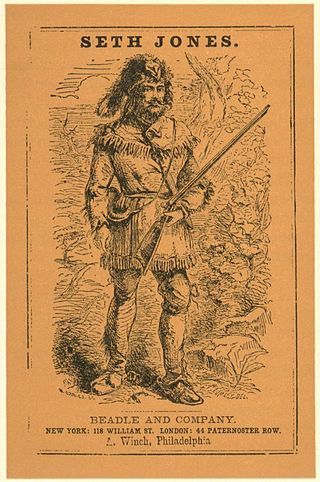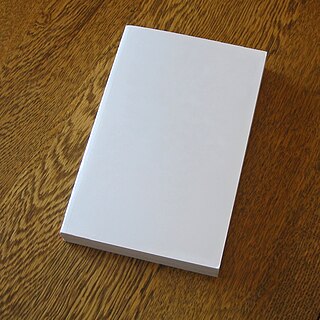Related Research Articles
Pulp magazines were inexpensive fiction magazines that were published from 1896 until around 1955. The term "pulp" derives from the cheap wood pulp paper on which the magazines were printed. In contrast, magazines printed on higher-quality paper were called "glossies" or "slicks". The typical pulp magazine had 128 pages; it was 7 inches (18 cm) wide by 10 inches (25 cm) high, and 0.5 inches (1.3 cm) thick, with ragged, untrimmed edges. Pulps were the successors to the penny dreadfuls, dime novels, and short-fiction magazines of the 19th century.

The dime novel is a form of late 19th-century and early 20th-century U.S. popular fiction issued in series of inexpensive paperbound editions. The term dime novel has been used as a catchall term for several different but related forms, referring to story papers, five- and ten-cent weeklies, "thick book" reprints, and sometimes early pulp magazines. The term was used as a title as late as 1940, in the short-lived pulp magazine Western Dime Novels. In the modern age, the term dime novel has been used to refer to quickly written, lurid potboilers, usually as a pejorative to describe a sensationalized but superficial literary work.

A paperback book is one with a thick paper or paperboard cover, and often held together with glue rather than stitches or staples. In contrast, hardback (hardcover) books are bound with cardboard covered with cloth, leather, paper, or plastic.

Academic publishing is the subfield of publishing which distributes academic research and scholarship. Most academic work is published in academic journal articles, books or theses. The part of academic written output that is not formally published but merely printed up or posted on the Internet is often called "grey literature". Most scientific and scholarly journals, and many academic and scholarly books, though not all, are based on some form of peer review or editorial refereeing to qualify texts for publication. Peer review quality and selectivity standards vary greatly from journal to journal, publisher to publisher, and field to field.

Penguin Books Limited is a British publishing house. It was co-founded in 1935 by Allen Lane with his brothers Richard and John, as a line of the publishers The Bodley Head, only becoming a separate company the following year. Penguin revolutionised publishing in the 1930s through its inexpensive paperbacks, sold through Woolworths and other stores for sixpence, bringing high-quality fiction and non-fiction to the mass market. Its success showed that large audiences existed for serious books. It also affected modern British popular culture significantly through its books concerning politics, the arts, and science.

Routledge is a British multinational publisher. It was founded in 1836 by George Routledge, and specialises in providing academic books, journals and online resources in the fields of the humanities, behavioural science, education, law, and social science. The company publishes approximately 1,800 journals and 5,000 new books each year and their backlist encompasses over 140,000 titles. Routledge is claimed to be the largest global academic publisher within humanities and social sciences.

Henry Morley was an English academic who was one of the earliest professors of English literature in Great Britain. Morley wrote a popular book containing biographies of famous English writers.
Stanford University Press (SUP) is the publishing house of Stanford University. It is one of the oldest academic presses in the United States and the first university press to be established on the West Coast. It is currently a member of the Association of University Presses. The press publishes 130 books per year across the humanities, social sciences, and business, and has more than 3,500 titles in print.
The Amalgamated Press (AP) was a British newspaper and magazine publishing company founded by journalist and entrepreneur Alfred Harmsworth (1865–1922) in 1901, gathering his many publishing ventures together under one banner. At one point the largest publishing company in the world, AP employed writers such as Arthur Mee, John Alexander Hammerton, Edwy Searles Brooks, and Charles Hamilton. Its subsidiary, the Educational Book Company, published The Harmsworth Self-Educator, The Children's Encyclopædia, and Harmsworth's Universal Encyclopaedia. The company's newspapers included the Daily Mail, the Daily Mirror, The Evening News, The Observer, and The Times. At its height, AP published over 70 magazines and operated three large printing works and paper mills in South London.

John Cassell was an English publisher, printer, writer and editor, who founded the firm Cassell & Co, famous for its educational books and periodicals, and which pioneered the serial publication of novels. He was also a well-known tea and coffee merchant and a general business entrepreneur who, through the mutation of his eponymous product 'Cazzoline', was the origin of the word 'gasoline'. A fervent Christian, he campaigned throughout his life for the temperance movement in Britain, and for the reduction of taxes on publishing. He was a social reformer who recognised the importance of education in improving the life of the working class, and whose many publications, both magazines and books, brought learning and culture to the masses.
The Charles H. Kerr Publishing Company is an American publishing company. The company was established in Chicago, Illinois, in 1886 as Charles H. Kerr & Co. by Charles Hope Kerr, originally to promote his Unitarian views. As Kerr's personal interests moved from religion to populism to Marxism and he became interested in the labor movement, the company's publications took a similar turn. During the 1920s Kerr ceded control of the firm to the Proletarian Party of America, which continued the imprint as its official publishing house throughout its four decades of organized existence.

D. Appleton & Company was an American publishing company founded by Daniel Appleton, who opened a general store which included books. He published his first book in 1831. The company's publications gradually extended over the entire field of literature. It issued the works of contemporary scientists, including those of Herbert Spencer, John Tyndall, Thomas Huxley, Charles Darwin, and others, at reasonable prices. Medical books formed a special department, and books in the Spanish language for the South America market were a specialty which the firm made its own. In belles lettres and American history, it had a strong list of names among its authors.
Angus & Robertson (A&R) is a major Australian bookseller, publisher and printer. As book publishers, A&R has contributed substantially to the promotion and development of Australian literature. The brand currently exists as an online shop owned by online bookseller Booktopia. The Angus & Robertson imprint is still seen in books published by HarperCollins, a News Corporation company.

The media in Wales provide services in both English and Welsh, and play a role in modern Welsh culture. BBC Wales began broadcasting in 1923 have helped to promote a form of standardised spoken Welsh, and one historian has argued that the concept of Wales as a single national entity owes much to modern broadcasting. The national broadcasters are based in the capital, Cardiff.

Arcadia Publishing is an American publisher of neighborhood, local, and regional history of the United States in pictorial form. Arcadia Publishing also runs the History Press, which publishes text-driven books on American history and folklore.
Cassell is a British book publishing house, founded in 1848 by John Cassell (1817–1865), which became in the 1890s an international publishing group company.
Frederick Joseph Harvey Darton was an author, publisher, and historian of children's literature. He was best known for his pioneering works in The Story of English Children's Books in England: Five Centuries of Social Life (1932). The Children's Books History Society presented an award in his honour.
Richard Walsh is an Australian publisher, editor, company director, media consultant, lecturer, broadcaster and journalist. For many years he ran the publishing and bookselling firm Angus & Robertson and later he headed the media company Australian Consolidated Press. In those roles he was "one of the most dominant figures in Australian publishing from the early seventies".
Maggie Browne, the pen-name of Margaret Andrewes née Hamer (1864-1937), was an English author of fiction and non-fiction children's books, who is best known today for Wanted, a King, an Alice in Wonderland-type story.
This page list the published work of Harry Collingwood, the pseudonym for William Joseph Cosens Lancaster. The 44 novels and the stories are organised by year of first publication, but the tables can be sorted interactively.
References
- ↑ Archibald Constable (1774-1827), an early owner of the Encyclopedia Britannica.
- ↑ "Morley's Universal Library". Publishing History (publishinghistory.com). Retrieved 2019-07-26.